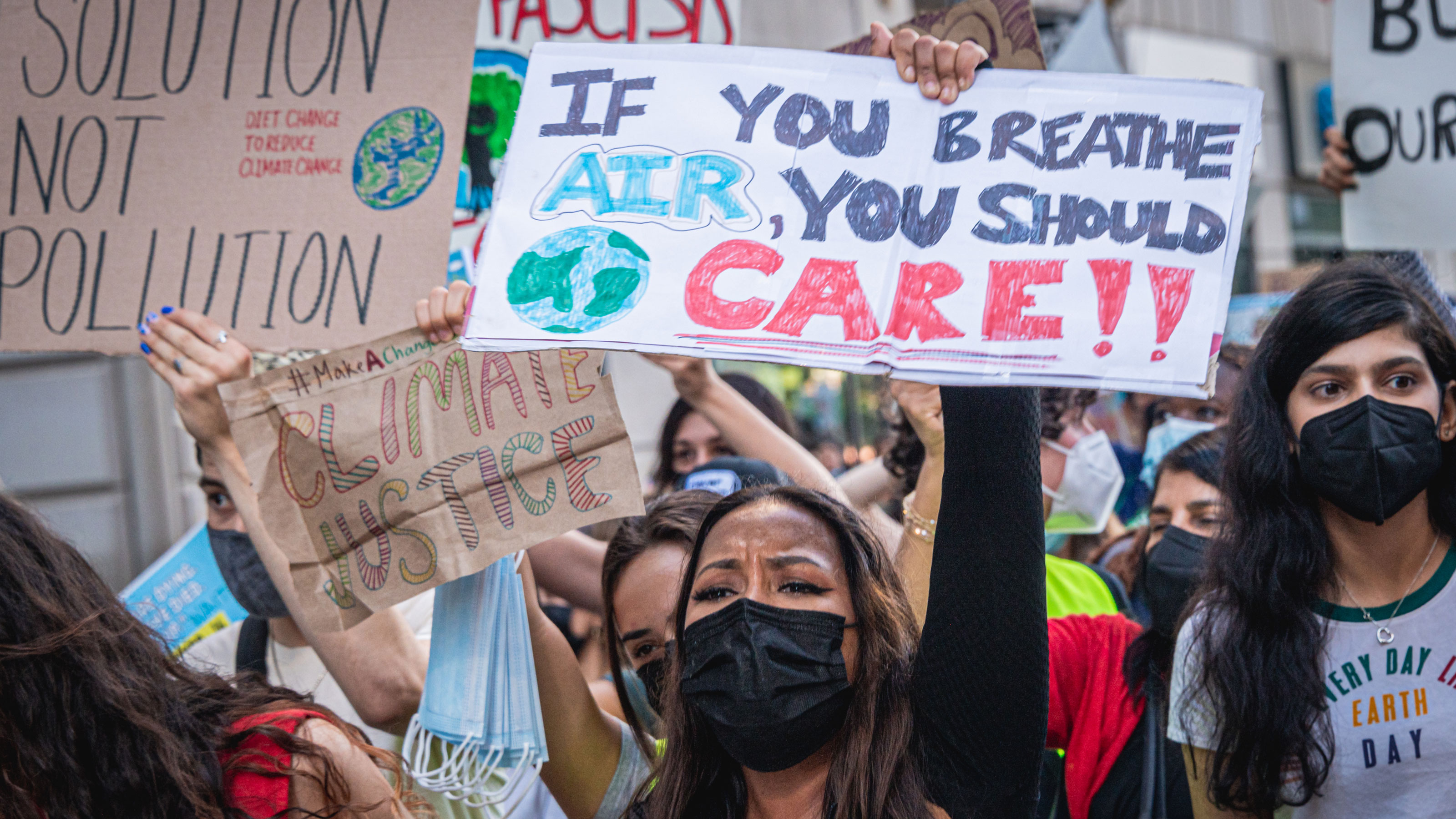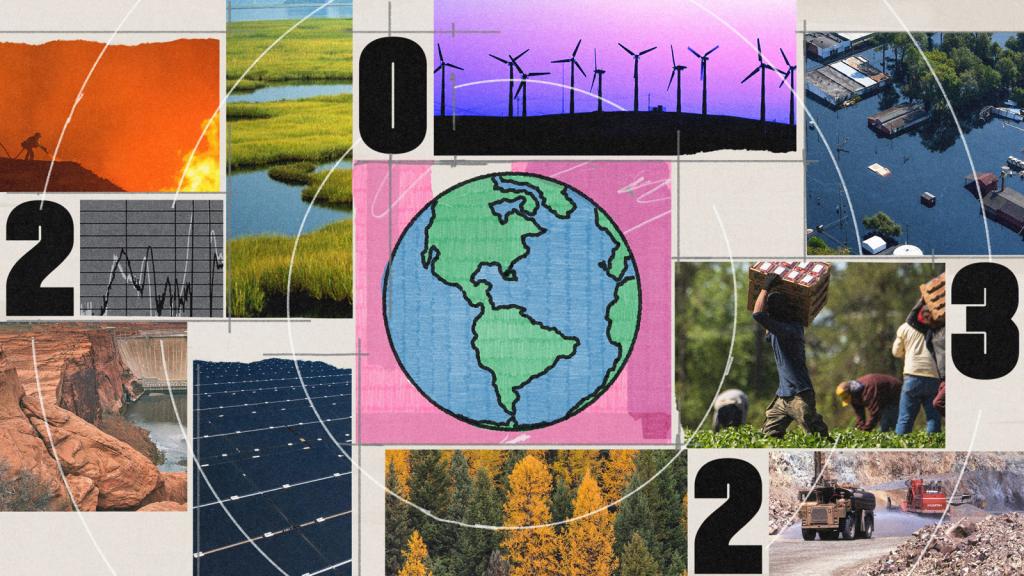Anandita Sabherwal is a doctoral student at the Grantham Research Institute at the London School of Economics and Political Science. Adam Pearson is an associate professor of psychology and Director of the Sustainability, Climate Change, and Inequality Lab at Pomona College. Gregg Sparkman is a postdoctoral fellow in the Andlinger Center for Energy and the Environment at Princeton University.
Last month, more protestors took to the streets in 1,500 cities and communities in 92 countries in what was the first global climate strike since the coronavirus pandemic began almost two years ago. Slogans like “Burn capitalism, not the planet,” and “No politician is doing enough” offered a clear signal of the collective frustration so many people have with global leaders. More than 50 activists blocked a busy motorway in London, and nearly 900 others were arrested while attempting to stop construction of the Line 3 oil pipeline in Minnesota. A recent 10-nation survey of more than 10,000 young adults found that 58 percent feel a sense of betrayal when thinking about their governments’ responses to climate change.
People are getting angry. And that might be a good thing.
Psychologists call anger a motivating emotion, one that often triggers action. People intuitively know this: When we see someone who’s fuming mad, we often assume they’re likely to do something. But what happens if you learn that many people share your anger about an issue? You may rightfully expect that they will come together to act on it — and feeling the crowd is on your side, you might be inclined to join.
This mobilizing role is well documented in social science research. In a comprehensive analysis of videos, social media posts, newspaper reports, and legal documents conducted after the 2014 police killing of Michael Brown Jr. in Ferguson, Missouri, researchers found that those who witnessed displays of public anger became more likely to speak out against the injustice of police violence against Black people. This shared sentiment resulted in larger protests and bolstered the Black Lives Matter movement.
In our own research, we found that public anger may have similar benefits for combating climate change. We conducted a series of online experiments with more than 1,500 U.S. adults from across the political spectrum. We wanted to determine whether the perception that a growing number of Americans are angry about climate inaction would increase an individual’s support for climate action.
Participants received one of four messages, each featuring a simple line graph showing that a growing number of Americans are either angry about climate inaction, believe in human-caused climate change, or support climate action. The control group read about trends in television viewership. We then asked participants to estimate other people’s belief in climate change, support for climate mitigation, and likelihood that people would donate to or, volunteer with a climate organization or join a protest. We also asked everyone to provide their own responses to these questions.
We found that people who learned that a growing number of folks are angry about climate change were more inclined to believe that the U.S. public is likely to take collective action to address climate change.
More importantly, learning that others are angry emboldened people in our study to express their own outrage about climate, and they were more likely to support action to mitigate the crisis. Of those who saw the anger graph, 73 percent reported strong support for taking action; that figure was 56 percent among those who learned about other trends.
Surprisingly, these effects were as pronounced for Republicans as they were for Democrats. In fact, over 40 percent of Republicans who viewed the anger consensus message reported moderate or strong agreement that others should take action on climate change, whereas only 20 percent of Republicans shown the control message expressed this belief. In other words, learning that a growing majority of Americans were angry about climate inaction helped to bridge the partisan gap on climate change.
These findings suggest that collective anger can provide a powerful signal that others are prepared to take action. This may be especially important for people who routinely feel that their actions have little impact.
Why are messages about anger so effective?
Part of the explanation is the social psychological process known as “pre-conformity.” After learning that anger is on the rise, people expect that climate action will be a norm in the near future and shift their behavior to conform. In our study, the people who received the collective anger message estimated greater public support for a wide range of policies and anticipated that more Americans will take action to address climate change.
Our findings suggest such messages might also be perceived as more empowering than those emphasizing the scientific consensus or growing public concern. Anger appears to convince more people that others will soon act, and that makes them want to join.
Of course, public outrage may only go so far — it may not always spur action and can also lead to backlash. Critics have called Greta Thunberg “unstable” and “hysterical,” for example. In his recent book American Rage: How Anger Shapes Our Politics, political scientist Steven Webster argues that anger has a corrosive effect on democracies, fueling our current state of hyper-polarization and distrust of institutions and our fellow citizens.
To be sure, protests that result in damage to physical property may undermine popular support for social movements or inflame existing political divisions. But expressions of public anger can be powerful mobilizers. Research suggests angry messages are more likely to be re-shared on social media sites than many other types of content.
Highlighting the role of anger in the Black Lives Matter movement, author Myisha Cherry writes, “Anger emphasizes desire for a better world … it makes people eager to do something.” In BLM, and other movements such as #MeToo, shared anger toward injustice has transformed individuals into powerful collectives that have held businesses accountable, spurred legal reforms, and brought about institutional and cultural change. Similarly, climate activists and organizations can use anger as a unifying force, one that reflects our shared desires for a sustainable future and empowers us to come together to demand change.
The views expressed here reflect those of the authors.
Fix is committed to publishing a diversity of voices, and we want to hear from you. Got a bold idea, fresh perspective, or insightful news analysis? Send a draft, along with a note about who you are, to fix@grist.org.



